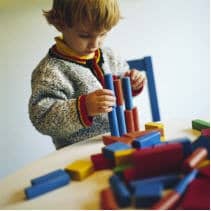We were contacted by Angie Larner of MathSavvyParents and we’re glad she did. Her web site is definitely worth a look. A math teacher, she shares her insight with parents on how to help their young kids with math and her site is packed full of advice and free resources. Angie has kindly agreed to write a guest blog post for us on early numeracy.
By Angie Larner

Can all students be good in math or are only certain students able to truly understand it? The truth is every student can excel in mathematics. They just need a solid foundation. Too many children start kindergarten without the skills they need.
Focus on Math from an Early Age
Research shows both families and preschools tend to focus on literacy activities instead of math. What a missed opportunity! The window of birth to age 5 holds exciting possibilities for children to create a network of connections that will grow into strong mathematical thinking. Our children are capable. The question is are we?
Building the Math Foundation Blocks
Did you know?
- Early patterns are the foundation for high school functions. Children at the age of 2 can extend simple AB patterns. Children in kindergarten should be well beyond just AB patterns. By third grade children should be efficiently using patterns to problem solve.
- Playing the memory game and sorting toys can help with identifying attributes. This understanding helps children with patterns, geometry, measurement, algebra, and numbers.
- Counting aloud is not the same as actually counting objects. Every fall, kindergartens arrive at school proud that they can count to 100. When asked to count objects, many of these same kindergartners struggle to actually count 4 or 5 blocks.
- One-to-one correspondence is an early skill that helps your child learn to count.
- Subitizing is a really important skill that helps children move past basic addition strategies to more efficient ones when they enter school.
- Learning to compose and decompose numbers and shapes is a foundational part of mathematics today.
Math can be Child’s Play
All of these concepts and tons more can be integrated into your child’s play. You can simply have fun the same way you always do with your child and ensure success in math. For example, you can count objects while playing or reading. (Doing so will also help you model counting that does not build misconceptions.) You can make shape monsters or fairly distribute cookies. While out walking you can go on a scavenger hunt for rectangles or look through your house and take pictures of rhombuses. You can measure with Legos or sort your dolls in various ways. You can easily challenge your child at the appropriate levels as long as you understand what is reasonable for your child to learn.
Foundational Skills Matter
Preschoolers take their play seriously. They work hard making connections and thinking through the task at hand whether building the tallest building they can for Spiderman to climb or hosting a party for all the princesses. They do not even realize you are helping to think even more deeply by asking them questions such as “We just added one more block to the roof. I wonder how many we have now?” or “What shape should the cookies be for the party?” These foundational skills matter! The number sense children have in kindergarten is a predictor of how well they do in mathematics in later years. Take time to help your preschooler develop a love of numbers, shapes, and relationships.
Mathematically Yours,
Angie Larner
Angie is a mom of 2 preschoolers, a professional developer for mathematics, and the founder of Mathsavvyparents. Her goal is to eradicate the fear of mathematics and the sentence, “Well, I was never really good at math.”

